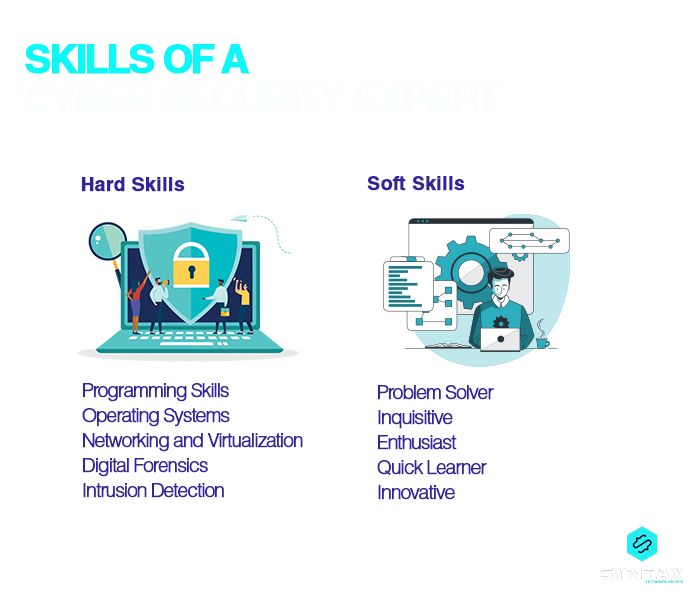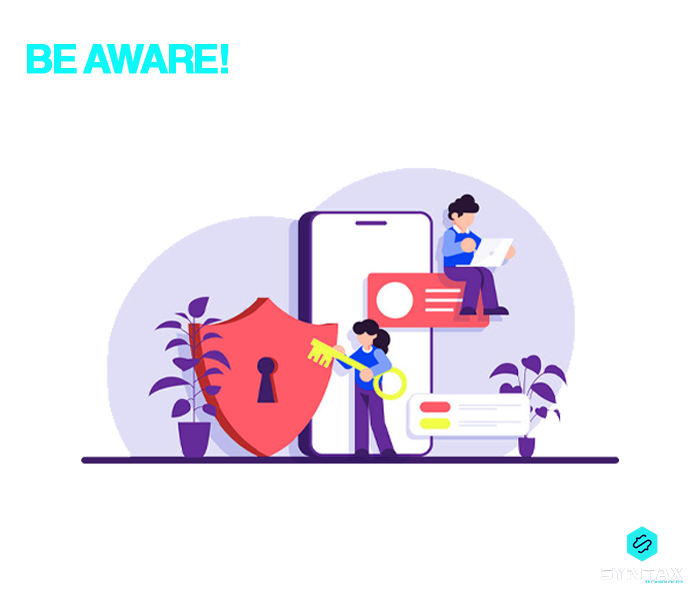Cyber Security is starting to become more prevalent within organizations, so opportunities to grow in this industry will never end, if you have the correct drive and determination – Joe Boyle, CEO of SaltDNA
The statement made by Joe Boyle, presents the picture of the Cyber Security industry as an evergreen one. The modern world has been swept by the power of digital revolution; however, cyber attacks and cyber crimes have emerged as an important by-product of this revolution.
Moreover, our dependence on the Internet and other digital platforms has only increased over time, which means that the Cyber Security field as an important career option is here to stay. But ?How to Get into Cyber Security?? This blog will provide you with a detailed guide which will set you firmly on a Cybersecurity career path.
Before we get into understanding the Cyber Security career pathway, it will be worthwhile to understand what Cyber Security is and why is Cyber Security important.
Cyber Security can be seen as the practice of providing protection and security to servers, computers, mobiles, programs, systems and networks; with the objective of defending them against malicious digital attacks (Cyber Security threats and Cyber Security attacks).
The nature of our modern lives happens to be increasingly dependent on digital systems, which has only heightened the possibility of Cyber attacks. These attacks might lead to loss of sensitive information resulting in operational and revenue loss, reputational risks and customer aversion, misuse of data, extortion attempts and so on.
Thus, it has become crucial to learn Cyber Security and consequently, a Cyber Security degree has emerged as one of the most lucrative and sought after credentials within the tech industry in current times.
In this blog, we will try to answer the question of how to get into Cybersecurity by considering some of the important issues like:
Deciding upon one?s career choice can be a confusing task. When you do consider the Cybersecurity industry as one of your options, you might find questioning yourself on certain issues. One common point of consideration deals with the value of Cyber Security as a potential career path.
Let us try to answer this question by looking at the scope of the Cyber Security space.

Is Cyber Security a Good Career Field?
One of the foremost advantages of pursuing a Cybersecurity career is in terms of the estimated compensation that one might expect as an expert in the field. Let?s all face it: money is one of the prime incentives within the job market and Cybersecurity professionals are assured of lucrative earnings.
As a domain, Cyber Security rests on a continuous struggle between experts and hackers, with cyber attacks becoming more and more sophisticated over time. Thus, a career in Cyber Security is highly dynamic and it provides you with unlimited opportunities for personal growth as you are always engaged in coming up with the best possible solutions for dealing with these threats.
When you are considering the idea of how to get into Cyber Security, you would be happy to know that they are innumerable entry points as there are a variety of industries to choose from.
Data forms the backbone of every organization from the smallest to the biggest ones and protecting it is one of the foremost concerns of all enterprises. Thus, Cyber Security experts and professionals have a huge playing field where they can venture into any sector of their liking as digitalization seems to have touched upon most of the industries.
Despite being a lucrative career option, the field of Cyber Security is looked at as a challenging and demanding domain. So is Cyber Security intrinsically difficult? Check out our blog on ?Is Cyber Security Hard?: Let us Find Out?
How to start a career in Cyber Security: Eligibility Criteria
When considering a career in Cyber Security, it is important to understand that Cyber Security professionals do not necessarily have specific degrees to their name. This implies that a degree in domains like Data Science, Computer science, IT, Machine Learning or software, might be a good starting point.
Even then, the field of Cyber Security is a vast one and every individual is capable of contributing in one way or the other. Consequently, the educational requirements for different Cyber Security careers may vary.
There are a number of entry level positions which do not require a bachelor?s degree in Cyber Security as an educational criterion. On the contrary, advanced jobs might entail the requirement of a bachelor?s or even a master?s degree in some cases. The scope of Cyber Security is so vast that even a diploma in IT can help you get started.
Cyber Security Career Pathway

There is no single source from which Cyber Security aspirants need to begin their career from. They might come from different directions; however, it is important that they have an intrinsic interest in understanding the working of technology. It is crucial for you to know what you are trying to protect and the reason behind the insecurity of things.
Thus, when experts are asked how to get into Cybersecurity, they generally suggest that it would be worthwhile to begin with an apprenticeship, internship or job in IT. This will help in developing an understanding of the basic Cyber Security concepts such as database management, configuring and administering systems, coding and networks. Moreover, it will help you develop an understanding of the IT procedures.
Additionally, since the domain of Cyber Security covers multiple categories, it is impossible to develop expertise in each one of them. It is suggested that you should narrow down your focus to a specific area.
Moreover, you should think of a Cyber Security career which you aim for as your ultimate objective. Correspondingly, you can search for IT jobs which would help you to cultivate the appropriate skills which will eventually help you in achieving your targeted position.
Articles you may like:
?How to learn Cyber Security?: Find the Answers?
?Cyber Security Skills, One Must be Aware Of?
?Top 40 Cyber Security Interview Questions?
?How to become a Cyber Security Analyst without a Degree?
Skills Required for Cyber Security Professionals
The domain of Cyber Security is a vast one and different job roles might entail different eligibility criteria and requisites. However, there are certain basic skills in terms of which you can evaluate yourself before initiating your Cyber Security career.
These can be hard/ technical skills as well as soft/ non-technical skills which an individual brings to an organization. In this blog, we will consider some of them.

Hard Skills
These skills are essentially those which pertain to competency in the technical aspects of the job.
1. Knowledge of programming languages
An understanding of some of the basic programming languages such as Java, Python, .NET and PHP, can be immensely useful in your career within the field. For instance, knowledge of C++ can be useful as a software engineer, knowledge of PHP can help you to understand security requirements and help you work with servers, and so on.
2. Understanding of operating systems
Knowledge of the fundamental elements of an operating system can be crucial in understanding the potential weaknesses of the system. These insecurities are often exploited by hackers and it would be an added value to your Cyber Security resume, to be aware of them.
3. Competence in networking and virtualization
An understanding of the way in which the network works as well as its basic components, can be extremely helpful in learning about Network Security, an important branch of Cyber Security.
Virtualization refers to the creation of virtual software within a device – separate from the original software of the device – which can help in running tests without needing additional hardware.
4. Ability to detect intrusion
This might require familiarity with the Intrusion Detection System (IDS). IDS is a software solution which can help in monitoring systems for any kind of malicious activities. It helps in identifying the malicious event and reporting it to the corresponding system or network administrator.
5. Digital forensics
This would involve developing skills which could help in analyzing a security breach or a cyber attack and consequently identify the probable culprit. This would involve developing expertise in the usage of various tools of digital forensics.
Soft Skills
These skills are considered to be those which help one fit within a workplace. They are intangible and are difficult to quantify. From the perspective of a Cybersecurity career path, these might include:
- An inherent desire to learn
- Problem solving skills
- Ability to show initiative and take decisions with confidence
- Competence in working creatively and coming up with new ideas
- An inquisitive nature and a passion for the IT sector
- It is a dynamic field and being a quick learner capable of adapting to new technologies can be an added advantage
How to start a career in Cyber Security: Jobs to target
The Cyber Security career path is like a tree with several branches. People seeking to initiate a career in Cyber Security come from diverse backgrounds, both technical and non-technical.
There are numerous job roles within the field of Cyber Security and in this section, we will try to look at some of them on the basis of classifying them as technical Cyber Security jobs and non-technical Cyber Security jobs.
Technical Cyber Security jobs might include ones which require in-depth computer knowledge; however, much of it is also learnt as a part of one?s job experience. Accordingly, some of the job titles are:
Security Engineer
In this capacity, you will be responsible for evaluating the network for the presence of any kind of threat, monitoring it for security breaches and coming up with security policies and plans. As a Security Engineer, you might also be required to develop a detailed response plan in case of any data breach.
Virus Technician
This job role would require you to keep yourself updated on the latest nature of cyber threats in the form of viruses and other forms of malware. As a Virus Technician, you will also be required to develop software programs which can be an effective defensive mechanism against these threats.
Cryptographer
In this position, you will be responsible for comprehending, analyzing and even developing encryption algorithms. The objective of these algorithms is to ensure data security.
Penetration Tester/ Certified Ethical Hacker
In the capacity of a Penetration Tester, you adopt the role of an ethical hacker who is bound by the terms of agreement of the parent company. As an ethical hacker, you will be responsible for protecting your company?s network against malicious hackers.
When you are evaluating the question of how to get into Cyber Security; a non-technical background should not be a stopping factor for you. A non-technical background, in all probability means that the person might not be having development and coding skills; however, there are multiple job roles within the Cyber Security domain, where you might not need these skills in order to be hired.
For instance, if a person wants to start his Cyber Security career as a technical writer, he may do so on the basis of his written communication skills. Let us consider some of those jobs:
Network Administrator
In the capacity of an administrator, you will be responsible for securing the network of the company by providing access to only those who are in need of it.
Cyber Policy Analyst
You will be responsible for developing policies, procedures and strategies for the private and public companies as well as the Government.
SOC Analyst
This stands for the position of a Security Operations Center Analyst. In this capacity, you will be responsible for reporting on cyber incidents which are likely to pose a threat to different branches of the Government. You might also come up with policy recommendations for mitigating cyber attacks.
Vulnerability Analyst
You will be required to make use of security tools for detecting any kind of existing flaw in the system, network or application. Additionally, you will need to keep yourself updated on every kind of new threat or vulnerability.

Careers in Cyber Security: Industrial Openings
As a Cyber Security professional, you stand a chance to be recruited in different industrial settings. Some of these might include:
Banking Sector
Operating within a regulatory environment; the banking sector remains an attractive target for cyber criminals.
Cyber Security Law
Data breaches can result in liability which might be handled by lawyers who specialize in Information Security.
Federal Government
The U.S. Government spends huge amounts of money on Cyber Security every year. All security personnel are required to acquire Cyber Security certifications which are approved for DoD 8570/8140.
Utilities
Cyber Security professionals are required to provide protection to utilities which can be a vulnerable target for cyber attacks.
How to get into Cyber Security: Points to consider
As you think of initiating your career in Cyber Security, you should try to consider certain important points. We have already dealt with some of these important aspects above.
However, besides that you can consider if you have certifications related to the field and if not, then what possible options do you have to acquire the same. Remember, that there is no one best way to begin with Cyber Security.
You can opt for a traditional route of going back to school, adopt a self-taught approach or choose an option which has become increasingly attractive in recent times and that is bootcamps.
Bootcamps provide you with a relatively cheap and a quick route to acquire Cyber Security skills. Moreover, they guarantee considerable flexibility to students.
Conclusion
In today?s digital era, almost every organization requires a security professional. Thus, it is evident that there has not been a better time to think of a career in Cyber Security.
It is definitely one of the most rewarding and fascinating career paths in current times. You should begin by undertaking detailed research on the options available, skills required, certifications you possess and your educational background.
Accordingly, you should decide upon the appropriate Cyber Security career pathway.
Syntax Technologies, provides you the advantages which a bootcamp has to offer. As one of the best online training providers, it helps you to acquire Cyber Security skills within a short span, along with full career support and end to end assistance.

